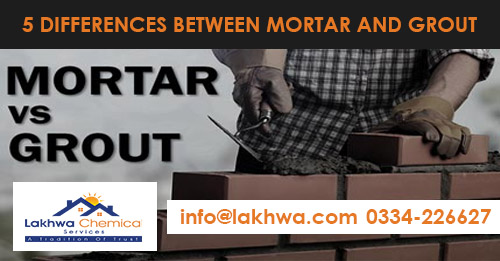5 difference between Mortar and Grout
Although mortar and grout are used for fixing tile, these materials should not be used interchangeably. Mortar and grout are applied in various applications, particularly in masonry. While both adhesives share some similarities, they, however, serve different purposes, making them suitable for specific tasks.
Following are five key differences between mortar and grout.
-
Composition and Purpose
Mortar
Mortar is a mixture of cement, sand, and water, and lime. Its primary purpose is to bind materials like bricks, stones, and concrete blocks to create a solid structure. Mortar is used for laying bricks or blocks, as well as for rendering and plastering.
Grout
Grout is composed of cement, water, and fine aggregates like sand, with the addition of admixtures for specific characteristics. Grout serves to fill gaps and voids between tiles, stones, or masonry units, providing stability antild preventing moisture or debris from infiltration.
Read More
What is Grouting? What are its Types?
The Most Economical Method for Heat Proofing Roofs
How to Fix Bathroom Tiles Leakage Solution in Pakistan?
-
Consistency and Application
Mortar
Mortar has a thicker composition and paste-like consistency, allowing it to support the weight of building materials. It is applied with a trowel and used for vertical and horizontal applications where structural integrity is crucial.
Grout
Grout has a more fluid consistency, making it suitable for narrow gaps between tiles or stones. It’s applied with a grout float or a grout bag. The fluidity of grout enables it to fill irregular spaces and conform to the shapes of the materials being joined.
-
Strength and Durability
Mortar
Mortar instills strong adhesion and bonding properties; it helps to ensure the stability of the closed structure. Mortar can withstand the stresses of load-bearing applications and changes in temperature and moisture.
Grout
Grout is not designed to bear structural loads. Instead, it offers sealing and stabilizing properties, enhancing the appearance and integrity of the finished surface. While grout contributes to the overall durability of tile installations and masonry joints, it relies on the strength of the surrounding materials.
-
Color and Aesthetic Considerations
Mortar
Mortar is available in various colors to match the aesthetics of the building materials. This is particularly important when the mortar joints are visible, as it contributes to the overall appearance of the finished structure.
Grout
Grout is available in a range of colors to complement or contrast with the tiles or stones being installed. Choosing the right grout color can impact the visual appeal of the place. Moreover, it allows for customization based on design preferences.
Read More
Understanding the Expansion Joint Treatment Specification in Pakistan
Places to Find SBR Waterproofing Chemical Price in Karachi
How to Seal a Steel Water Tank and Stop Leakage From It?
-
Placement and Application Techniques
Mortar
Mortar is placed between bricks, stones, or blocks during the construction process. It is used to bond materials and create a solid and cohesive structure. Mortar joints can vary in thickness and style, affecting both the visual appeal and the structural strength of the construction.
Grout
Grout is applied after the installation process is over. In other words, the tiles, stones, or masonry units are set in place. It is used to fill the spaces between units, preventing moisture, dirt, and debris from infiltrating the surface. Grout lines can vary in width and depth, affecting the overall appearance of the installation.
Conclusion
While mortar and grout are both integral to construction and masonry work, they serve distinct purposes and exhibit differences in composition, application, strength, and aesthetic considerations. Mortar primarily functions as a binding agent for structural stability, while grout is used for filling gaps and enhancing the appearance and durability of finished surfaces. Understanding these differences is essential for selecting the right material for specific applications and ensuring the success of construction projects.
If you want to know more about grout and other similar adhesives, contact Lakhwa Chemical Services. We’re the best in the business!




Leave a Reply
Want to join the discussion?Feel free to contribute!